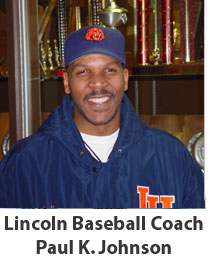- Posted in All University
- Category: Campus News
Coach Brings Winning Ways, Diamond Experience to Lions’Program; Season Opens at Home On March 8th Against McDaniel College
 Lincoln University, PA (www.lincoln.edu) — Lincoln University has appointed Paul K. Johnson as its new head baseball coach. Coach Johnson brings a wealth of organized baseball experience – most notably from the youth and college ranks – to the Lincoln program. The Lions will open the 2003 season – weather and field conditions permitting — in a home doubleheader against McDaniel College (formerly Western Maryland University) on Saturday, March 8 at 12 noon. The team will play a 22-game schedule.
Lincoln University, PA (www.lincoln.edu) — Lincoln University has appointed Paul K. Johnson as its new head baseball coach. Coach Johnson brings a wealth of organized baseball experience – most notably from the youth and college ranks – to the Lincoln program. The Lions will open the 2003 season – weather and field conditions permitting — in a home doubleheader against McDaniel College (formerly Western Maryland University) on Saturday, March 8 at 12 noon. The team will play a 22-game schedule.
Johnson’s previous collegiate experience includes assistant coaching stints at Bucks County Community College (Pa.) and Montgomery County Community College (Pa.) during the 1999 and 2000 seasons. While at Bucks County Community College, he was an interim head baseball coach at one juncture of the 1999 season and also served as a first and third base coach. Johnson was also the team’s hitting instructor
Johnson, a 1992 graduate of Drexel University in Philadelphia who majored in business administration, has also experienced a great deal of success on the city’s youth baseball scene as a head coach in the Philadelphia Phillies Senior Intramural RBI (Revitalizing Baseball In the Inner Cities) League Program (ages 16-18). As head coach of the RBI League’s Philly Area Black Sox of Sayre/Morris Recreation Center, Johnson led his team to league championships in 2002, 1998, 1997 and 1996. This included a 22-0 record in 1996. Johnson will continue to coach the Black Sox baseball team at the end of the Lions’ season.
Johnson was the only non-high school or non-collegiate coach to be selected to the East-West Ambassadors Baseball Tour to Puerto Rico in 1995. Johnson’s 13-year youth baseball coaching record is 183-53-3, which includes nine league championships, 12 division titles and 12 championship appearances.
A number of Johnson’s youth players, including Marc Holley (Lincoln ‘01), Eric Pugh (Greensboro College) and Andre Andrews (Penn State-Abington) have moved onto the college ranks. Johnson, who has also coached on the American Legion and Babe Ruth League levels, hopes to utilize his youth baseball connections along the Northeast corridor (specifically New York to Washington, D.C.) to improve the Lions baseball program.
“We’ve got a team with a lot of potential,” said Johnson. “I’m really looking forward to the new season. Our guys have been working hard to get ready for the upcoming season. I’m also looking forward to bringing the most talented baseball players available to the Lincoln program. High school and inner-city youth baseball programs along the Northeast corridor has greatly improved in recent years.”
Coach Johnson is committed to teaching the fundamentals of the game—aggressive base running/stealing, consistent hitting, effective pitching and solid defense—to give his teams the best opportunity to be successful.
Founded in 1854 as America’s first Historically Black University, Lincoln University is one of the nation’s leading producers of African Americans with undergraduate degrees in the physical sciences (biology, chemistry and physics); computer and information sciences; and biological and life sciences. The University’s liberal arts and sciences-based undergraduate curriculum, and selected graduate courses, meet the needs of students competing in a highly technological and global society.
The University will celebrate its sesquicentennial, or 150th anniversary, from April 2003 through May 2004 with an array of campus and external events, activities and announcements.